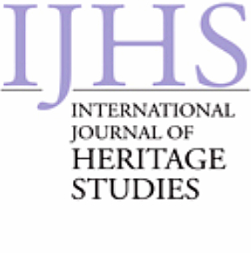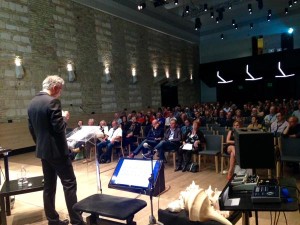 Tony Whyton (Birmingham City University) and George McKay (University of East Anglia) have a planned co-edited special issue of the leading publication, International Journal of Heritage Studies, on research findings and perspectives from the CHIME project. In the past few weeks two of the articles have been pre-published online, in advance of paper publication in the special issue. We will keep you informed when further pieces are available, and of course when the special issue is complete and available. But in the meantime here are information and links about the two to date.
Tony Whyton (Birmingham City University) and George McKay (University of East Anglia) have a planned co-edited special issue of the leading publication, International Journal of Heritage Studies, on research findings and perspectives from the CHIME project. In the past few weeks two of the articles have been pre-published online, in advance of paper publication in the special issue. We will keep you informed when further pieces are available, and of course when the special issue is complete and available. But in the meantime here are information and links about the two to date.
Whyton, Tony. 2018. ‘Space is the place: European jazz festivals as cultural heritage sites.’ International Journal of Heritage Studies. DOI 10.1080/13527258.2018.1517375
ABSTRACT: The JPI-Heritage Plus supported Cultural Heritage and Improvised Music in European Festivals (CHIME) project was established to examine the workings of jazz festivals and their relationship to cultural heritage as discursive practice. Jazz festivals occupy a significant – if undervalued – place in the ecologies of Europe’s cultural heritage, with their dynamic and synergetic relationship to spaces and cultural sites. Drawing on a number of case studies and interviews with members of the Europe Jazz Network, this article presents a typology of European jazz festivals and cultural heritage sites that can be used to inform the different ways in which jazz offers meaning to specific groups and locations. By viewing jazz festivals through the lens of cultural heritage, we can begin to challenge reified presentations of heritage that promote uncomplicated interpretations of nations, people and their associated cultural narratives. Festivals offer meaning to specific groups through acts of remembrance or commemoration, they have the potential to engage with a multitude of voices, and their locations enable people to negotiate a sense of belonging or to (re)consider their place in the world.
Request open access version here.
McKay, George. 2018. ‘The heritage of slavery in British jazz festivals.’ International Journal of Heritage Studies. DOI 10.1080/13527258.2018.1544165
ABSTRACT: This article explores site-specific heritage questions of the contemporary cultural practice of festivals of jazz – a key transatlantic music form – by bringing together three areas for discussion and development: questions of slavery heritage and legacy; the location, built environment and (touristic) offer of the historic city; and the contemporary British jazz festival, its programme and the senses or silences of (historical) situatedness in the festival package. Other artistic forms, cultural practices and festivals are involved in self-reflexive efforts to confront their own pasts; such are discussed as varying processes of the decolonisation of knowledge and culture. This provides the critical and cultural context for consideration of the jazz festival in the Georgian urban centre. Preliminary analysis of relevant jazz festivals’ programmes, commissions and concerts leads to interrogating the relationship – of silence, of place – between jazz in Britain, historic or heritage locations and venues, and the degree or lack of understanding of the transatlantic slave trade. The heritage centres clearly associated with the slave trade that also have significant (jazz) festivals referred to include Bristol, Cheltenham, Edinburgh, Glasgow, Hull, Lancaster, Liverpool, London, and Manchester.







